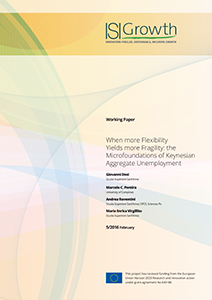Wages are an element of cost crucially affecting the competitiveness of individual firms. But the wage bill is also a crucial element of aggregate demand. Hence it could be that more “flexible” and fluid labour markets, while allowing for faster inter-firm reallocation of labour, may also render the whole economic system more fragile, more prone to recession, more volatile. In this work we investigate some conditions under which such a conjecture applies. The paper presents an agent- based model that investigates the effects of two “archetypes of capitalism”, in terms of regimes of labour governance – defined by the mechanisms of wage determination, firing, labour protection and productivity gains sharing – upon (i) labour market regularities and (ii) macroeconomic dynamics (long-term rates of growth, GDP fluctuations, unemployment rates, inequality, etc..).
The model is built upon the “Keynes meets Schumpeter” family of models (Dosi et al., 2010), explicitly incorporating different microfounded labour market regimes. Our results show that seem- ingly more rigid labour markets and labour relations are conducive to coordination successes with higher and smoother growth.
 When more Flexibility Yields more Fragility: the Microfoundations of Keynesian Aggregate Unemployment
When more Flexibility Yields more Fragility: the Microfoundations of Keynesian Aggregate Unemployment
Giovanni Dosi
Scuola Superiore Sant’Anna
Marcelo C. Pereira
University of Campinas
Andrea Roventini
Scuola Superiore Sant’Anna; OFCE, Sciences Po
Maria Enrica Virgillito
Scuola Superiore Sant’Anna
